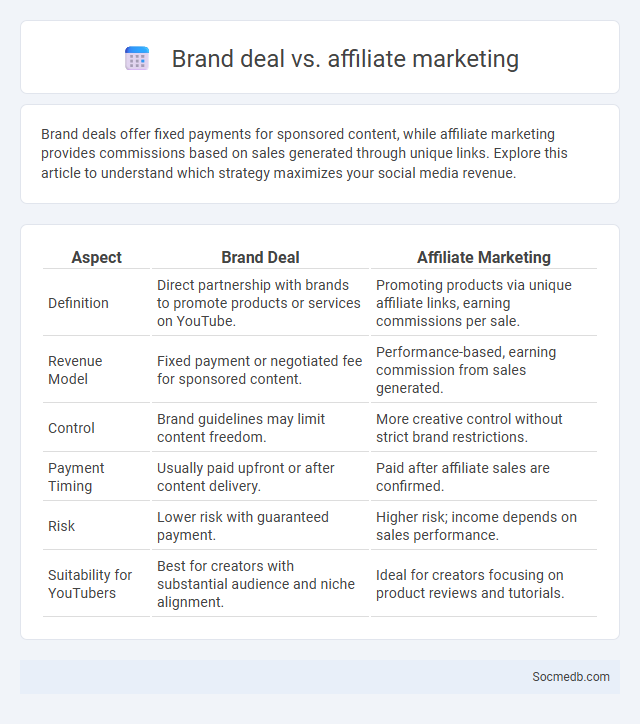
Photo illustration: Brand deal vs Affiliate marketing
Brand deals offer fixed payments for sponsored content, while affiliate marketing provides commissions based on sales generated through unique links. Explore this article to understand which strategy maximizes your social media revenue.
Table of Comparison
| Aspect | Brand Deal | Affiliate Marketing |
|---|---|---|
| Definition | Direct partnership with brands to promote products or services on YouTube. | Promoting products via unique affiliate links, earning commissions per sale. |
| Revenue Model | Fixed payment or negotiated fee for sponsored content. | Performance-based, earning commission from sales generated. |
| Control | Brand guidelines may limit content freedom. | More creative control without strict brand restrictions. |
| Payment Timing | Usually paid upfront or after content delivery. | Paid after affiliate sales are confirmed. |
| Risk | Lower risk with guaranteed payment. | Higher risk; income depends on sales performance. |
| Suitability for YouTubers | Best for creators with substantial audience and niche alignment. | Ideal for creators focusing on product reviews and tutorials. |
Introduction to Brand Deals and Affiliate Marketing
Brand deals and affiliate marketing are powerful strategies for monetizing social media presence by partnering with companies to promote products or services. Influencers leverage their audience engagement and trust to earn commissions or flat fees through sponsored content, affiliate links, and exclusive discount codes. Effective brand collaborations enhance influencer credibility while driving targeted traffic and sales for businesses across platforms like Instagram, YouTube, and TikTok.
What is a Brand Deal?
A brand deal is a paid partnership between a social media influencer and a company where the influencer promotes the brand's products or services to their audience. These collaborations often involve sponsored posts, product placements, or exclusive discount codes to increase brand awareness and drive sales. Brand deals leverage the influencer's reach and credibility to target specific market segments effectively.
Understanding Affiliate Marketing
Affiliate marketing leverages social media platforms to connect influencers and brands, driving sales through trackable referral links. By understanding your audience's interests and behaviors, you can select affiliate products that resonate and increase conversion rates. Effective use of targeted content and engagement strategies enhances your potential commission earnings while fostering trust with followers.
Key Differences Between Brand Deals and Affiliate Marketing
Brand deals involve direct partnerships where influencers receive fixed payments or product compensation for promoting a specific brand, ensuring guaranteed income regardless of sales performance. Affiliate marketing relies on performance-based commissions, rewarding influencers with a percentage of sales generated through their unique referral links. Brand deals typically provide higher upfront earnings, while affiliate marketing offers scalable income tied directly to audience engagement and conversion rates.
Pros and Cons of Brand Deals
Brand deals on social media offer You increased visibility and potential revenue by connecting popular influencers with relevant brands, enhancing marketing reach through authentic promotion. However, these partnerships may lead to compromised content credibility if followers perceive the deals as inauthentic, risking audience trust and engagement. Managing transparency and aligning brand values with personal content are crucial to maximizing benefits while minimizing drawbacks in social media brand collaborations.
Pros and Cons of Affiliate Marketing
Affiliate marketing on social media offers the advantage of reaching a broad, targeted audience with minimal upfront costs, allowing you to monetize your content effectively. However, it can present challenges such as reliance on affiliate networks that may have fluctuating commission rates and the risk of promoting products that don't align with your personal brand, potentially damaging your credibility. Balancing authentic content with promotional efforts is crucial to maintaining your audience's trust while maximizing affiliate marketing benefits.
How Earnings Work: Brand Deal vs Affiliate Marketing
Brand deals offer fixed payments or performance-based bonuses directly from companies to influencers, often influenced by follower count, engagement rates, and content quality. Affiliate marketing earns creators commissions based on sales or leads generated through unique tracking links, aligning income directly with audience purchasing behavior. Both revenue models leverage social media reach but differ in risk, payment structure, and long-term earning potential.
Which Works Best for Influencers and Content Creators?
Instagram remains the top platform for influencers and content creators due to its strong visual focus, high engagement rates, and diverse content formats like Stories and Reels. TikTok is ideal for creators targeting younger audiences with short-form, viral video content that drives rapid growth and brand collaborations. YouTube offers long-form video opportunities, monetization options, and deeper audience connections, making it best for creators focused on educational, entertainment, or niche content.
Choosing the Right Monetization Strategy
Choosing the right monetization strategy on social media depends on your audience size, engagement rate, and content type. Platforms like Instagram and TikTok offer options such as sponsored posts, affiliate marketing, and merchandise sales to maximize your revenue. Understanding your niche and analyzing performance metrics will help you tailor your approach and optimize your earnings effectively.
Final Thoughts: Brand Deal or Affiliate Marketing?
Choosing between brand deals and affiliate marketing depends on your audience engagement and content style. Brand deals offer fixed payments and exclusive collaboration opportunities, while affiliate marketing provides passive income through commissions on sales driven by your referrals. To maximize your social media revenue, evaluate your followers' trust and buying behavior to determine which strategy best aligns with your goals.
 socmedb.com
socmedb.com